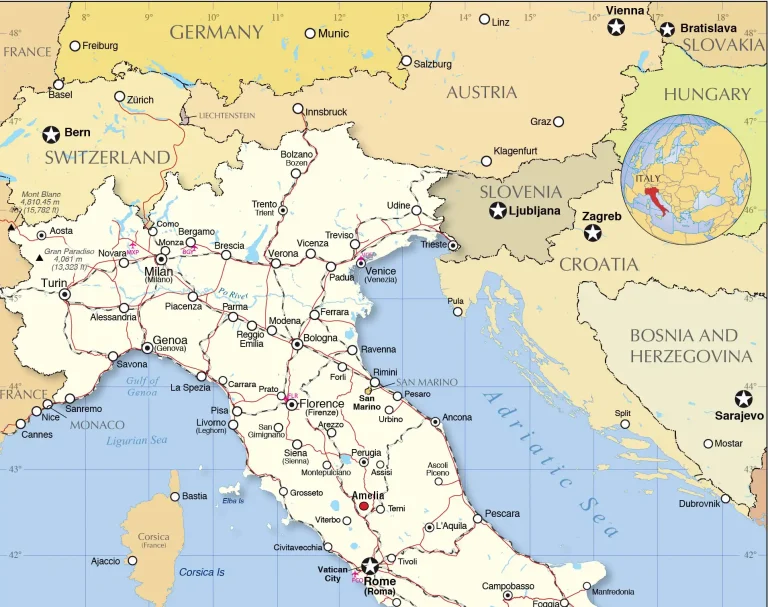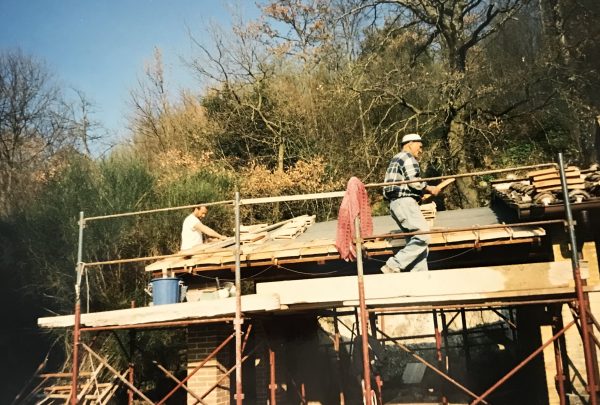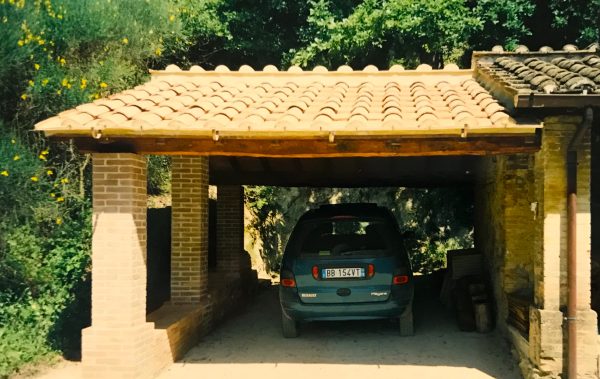#46: Italy, 2000
What Else Happened?
The previous post chronicled our year-long effort to renovate the south side of our old farmhouse. But that wasn’t all that happened in 2000. When we weren’t working with the artisans making our renovation dream come true, we were dealing with the bureaucracy, I was participating in a writer’s workshop at UCLA, R was crafting a writing adventure, and we both were taking “Magical Mystical Tour” day-trips to nearby hill towns and sights, plus longer excursions to Anacapri and Vienna. A busy, productive, fulfilling year, 2000. Here are some excerpts from family letters.
[As always, you can click on photos to enlarge them.]
January
Would you rather live in a culture which is very efficient but rather cold in its human interactions (e.g., Germany, Switzerland) or in a culture which is inefficient but warm (Italy, Laos)? Early this month, we were reminded of this choice, as we renewed our “green cards.” (Just one of the multiplicity of documents required to live here.) Italy’s green card is not like the one in the States; it’s not what resident aliens carry. 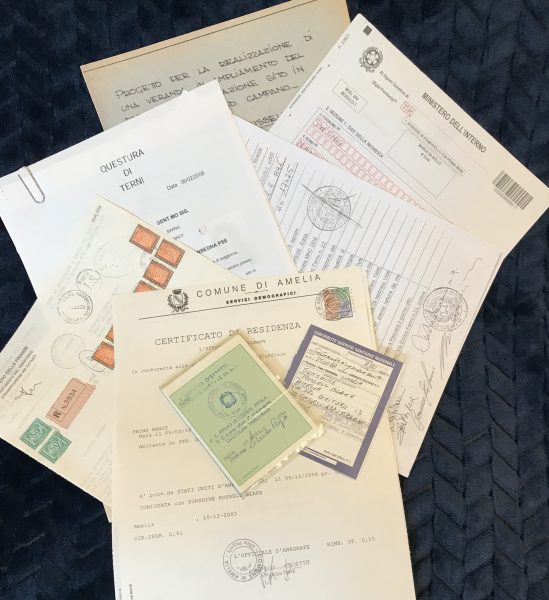 That’s a permesso di soggiourno, a baby-blue piece of paper with your photo on it. Italy’s green card is a health card. It allows you to have free basic medical care, including prescriptions, for an annual cost of 750,000 lire per family or c. $395 at today’s exchange rate.
That’s a permesso di soggiourno, a baby-blue piece of paper with your photo on it. Italy’s green card is a health card. It allows you to have free basic medical care, including prescriptions, for an annual cost of 750,000 lire per family or c. $395 at today’s exchange rate.
The choice between cultures is easy for us. As I write in early January, we still have flowers blooming, we’re eating lettuce out of our garden, and we got a bit over-warm pruning olives. As a matter of daily living, Italy offers wonderful food and lovely wine. We have supportive friends, and our interactions in local shops are personal, cordial and friendly. We live surrounded by daily reminders of thousands of years of history and culture. Being an Italian resident is just grand, even when dealing with the bureaucracy.
And the Italian bureaucracy requires a lot of patience and understanding. What with all the events of last winter, we forgot to renew our green cards. [Events detailed in posts 43, 44, 45] When we finally remembered in October, we hied off to the state health office in Terni, an hour’s drive, roundtrip. (Had we been Italian citizens, we could have done all this in Amelia, but it’s only fair that non-citizens go to the main office for special considerations.) A small, tough, elegant lady suggested that we wait until January 2000 to pay. One must pay for the whole year, and one pays in January, she explained. If one pays in October, one only gets two-months coverage for the price of a year. So we took a chance we wouldn’t need medical care (or if we did, we’d just pay for it) and returned to the health office January 4th.
The same lady said we had to go to the post office, pay our 750,000 lire and return with a receipt. I should mention that EVERYTHING here is paid at the post office — parking tickets, gas and electric bills, green card fees. It’s the central collection point for the government. And the disbursing point — at the first of the month, all the retirees line up to collect their pensions. So off we go to the nearest post office. It’s full of pensioners, every window backed up for days, it seems. I manage to catch the eye of a clerk and ask her for the proper form so we can fill it out while we wait. After a great deal of searching and conferring with colleagues, she returns to say they’re out of forms and we’ll have to go to the main post office downtown.
We clamber into the car, drive downtown, search for a parking place, finally give up and go to a paid-parking lot. We locate a city map (mounted here and there around town) and find the central post office. We enter to discover long lines of people waiting to pay their bills and/or collect their pensions. I again catch the eye of a clerk and ask for the proper form, using the photocopy of one and the message written in Italian that the Health Service lady had given us. The clerk rummages around in a metal cabinet and finally comes up with the form. We fill it out. We wait in line with our 750,000 lire. When we get to the window, this clerk says we’ve failed to fill out a couple of key items. We step out of line and do so. When she sees we’ve completed the form to her satisfaction, she motions us back to the window. Then she tells us it’s the wrong form.
She sends us to another window, where another clerk tries to figure out what we need. She finally comes up with the form, and I fill it out while Russell goes to pay more at the parking lot (you have to pay in advance). When he returns, I’m at the front of another line, paying the 750,000. But once again, the form isn’t filled out correctly. However, this nice lady helps me correct it then and there, and we return to the Health Service.
The HS lady tells us it’s the wrong form. She gets on the phone to the post office and talks tough with them. “Oh, at last someone answers the phone! You’ve given the Americans the wrong form! I wrote down in Italian exactly what form they need. No, I’m sorry, you have made a mistake. I know very well what form the Health Service needs. It’s you who don’t know.” etc. etc. After a great deal of bluster, the two agree that it’s someone else’s fault, perhaps the problem of the change of the year, new forms being required, and all ends cordially.
The HS lady says she is mortified (that’s literally what she said), but we must return to the post office and get the right form. It’s 1:00, and I’m afraid she’ll close her office for lunch, so we’d have to return the next day, because she’s only open in the mornings. I ask her if we should return before or after lunch. “Before! Before! I’ll wait for you.”
Back to the paid-parking lot. Back to the nice post office lady. We cancel the old form. Russell signs to say that he’s received a 750,000 refund. Then we fill out the new form with the help of the nice post office lady. She retains the 750,000. She, too, is mortified at all the trouble we’ve had. We say we’re sorry we don’t speak better Italian and that surely the majority of the fault must be ours for our poor ability to communicate. She says, no, no even Italians have trouble with all these new forms.
We return to the Health Service. The same lady is waiting for us with our renewed green cards ready. She is still mortified, and no, it’s not our poor Italian, it’s this bureaucracy with which we all must deal, We all struggle, she says, to do the best we can. Hand-shakes all around, multiple repetitions of tanti auguri (many good wishes) and buon anno (Happy New Year). Off we go, green cards in hand, feeling we’ve just won some complicated game without knowing the rules but with lots of nice helpers.
The whole thing was actually fun. It’s not fair to ask the Italians to be like the Germans (nor is it fair to ask the Germans to be like the Italians). Every country has its strong and its weak points. For us, we’ll take gentle winters, good food and wine, and nice-but-inefficient bureaucrats every time.
February
We’ve started a “Magical Mystical Tour” program. If we’re not careful, we get into a rut of daily shopping and working at home. We’re surrounded by wonderful places to visit, places where people pay lots of money to tour. So we decided to take at least one day a week and go somewhere.
We’re moving forward on the renovation front. A couple of weeks ago, we went with the mason to order hand-made bricks and tiles for the southside project. It took about an hour to get to the furnace in the hills above Orvieto, where a family makes bricks and tiles as it’s been done for millennia. A worker grabs a handful of gray clay brought from nearby digs, slops it into a wooden frame, levels it off with a simple tool and empties it onto the sandy floor. After a while, someone collects the clay forms and fires them in a simple furnace. The result is bricks and tiles with character, unlike industrial manufacturing whose products all look alike — too perfect to be real. We want the renovations to match the rest of the house, so we ordered tiles and bricks of various sizes to be delivered next week.
I’ve finally come up with a design for the south garden. It’s taken three years to “see” it. I drew a sketch for Russell, and he likes it too, so once the southside construction is done, we can get started on the garden.
March
We’ve now got an attractive carport attached to the outbuilding, thanks to mason Gianni and team working on that while we waited for all the materials we needed for the house renovation.
In February, I applied to a 10-week UCLA workshop for 12 writers who’ve completed novels to work with an award-winning author, polishing their manuscripts for submission to publishers. I haven’t been able to get back to writing for 18 months, and the program sounded perfect for my needs, in addition to getting away from here, where I’m constantly bombarded with things that need doing. I submitted the requisite 3000 words from my novel, plus a synopsis and a letter about why I wanted to attend. Then I tried not to hope too much. A little after mid-March, I got an email saying I’d been selected. So you won’t hear from me for a while as I participate in “Novel Writing IV.”
July
The UCLA workshop was well worth the time and expense. Sparing you specific details, I’ll share two larger insights that I found particularly helpful:
- The normal time period for writing a first novel and getting it ready to submit to publishers is 5-7 years. It’s a great deal of work, and the writer usually has lots of other things on his/her plate, so full-time writing is not possible. That felt very comforting to all of us.
- Talent is not enough. There’s a great deal of craft involved, and none of us were sufficiently skilled in all aspects of novel-writing. So we each got busy working hard on what we lacked. In my case, dialog and scene-setting, among other things.
Russell arrived near the end of the workshop, and we had a lovely time seeing friends and family. We also went to Honolulu in response to a wedding invitation which had arrived after my departure for LA. The bride’s parents were old friends and colleagues, he Lao, she Vietnamese. The wedding lasted three days, featuring customs from many cultures, including the groom’s Singapore Chinese tradition — church wedding, black-tie dinner dance at one of the best hotels, a baci [See Post #21 for details and pix of our baci in Vientiane.] and a luau complete with pig cooked in a pit lined with banana leaves and a former Miss Hawaii teaching us the hula. In between, we visited old friends from our days in HI.
Back home, Russell is developing a plan for his retirement years: undertaking extended international trips and writing essays and books about what he finds and whom he meets along the way. While we were traveling in the States, we chanced upon a professor who teaches creative writing at Johns Hopkins and who responded enthusiastically to R’s concept.
August
These are the hot days when we marshal our resources. We carefully close our shutters as the sun moves across the house. We pull white curtains over the windows in our offices, so we can work but be protected. Then in the evening, we open everything to catch the breeze. With the thick walls of the house and careful management, we don’t need air conditioning. God bless the people who built this house so perfectly for the climate.
September
Capri is not for the faint of heart. Since well before the Caesars, it’s been challenging to get there, challenging to get around, but well worth the effort. After a train ride with friends Umbro and Elisabetta, standing-room only to Rome, we got to sit the rest of the way to Naples. We wanted to ride on top of the catamaran ferry in the open air, but the steward said, “There’s a little sea today,” so no one was allowed on deck. Luckily, we found good seats in the center of the cabin, because the “little sea” was a Very Big One. There’d been a giant storm the night before, and although the sun was shining, the effects were still very much in evidence as far as the waves were concerned. Up, up, up we went. Down, down, down we went. And sideways too. The crossing took 45 minutes and virtually everyone was sick. Even Russell, who’s normally got a cast-iron stomach, was queasy. Lots of folks lost their lunches, but I managed to hold onto mine through sheer force of will. I spent the whole voyage staring at the floor and humming, having learned years ago from a stewardess to hum during air turbulence. Stiffens the diaphragm and stops your tummy from bouncing around so much, plus your mind is focused on something else.
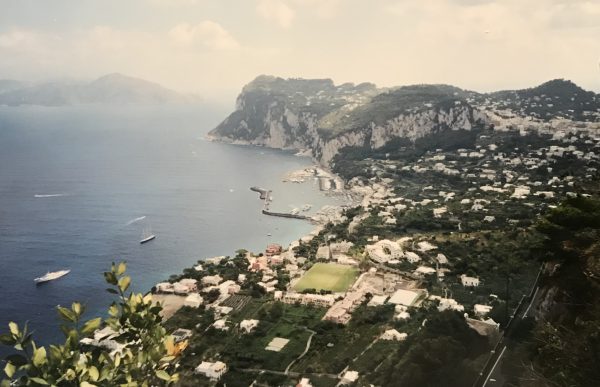 We stayed in Anacapri, a village several hundred feet above Capri town — less touristy, crowded and noisy. I visited the local pharmacy for help with sea sickness in case we had trouble on the way back. The pharmacist recommended Sea Bands, which you wear on your wrist with a pressure button over the acupuncture point. I confess it seemed like mo-jo to me, but in fact they did the trick on the return voyage, and I’ll never be without them when traveling on water.
We stayed in Anacapri, a village several hundred feet above Capri town — less touristy, crowded and noisy. I visited the local pharmacy for help with sea sickness in case we had trouble on the way back. The pharmacist recommended Sea Bands, which you wear on your wrist with a pressure button over the acupuncture point. I confess it seemed like mo-jo to me, but in fact they did the trick on the return voyage, and I’ll never be without them when traveling on water.
Russell left this morning (October 1) on the first of his travel/writing adventures, this one to Polynesia. He’s traveling light — a weekend bag of clothes and a small backpack-cum-briefcase with computer and accessories. During his two months away, he’ll visit Hawaii, the Marqueas, the Societies (including Tahiti), Tonga and New Zealand. Meanwhile, I plan to take advantage of the solitude to start revising my novel.
[His South Pacific experiences were later chronicled in Chapter 9 of his memoir, Far Away: True Tales from an International Life.]
October
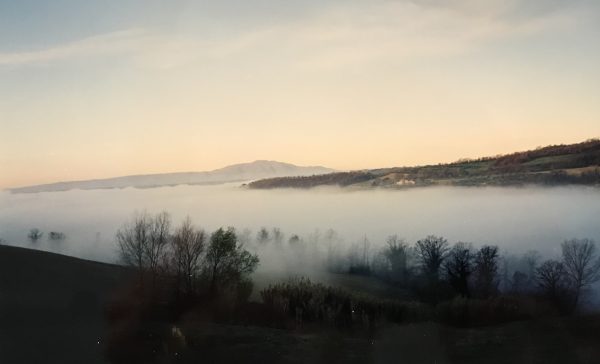 Fall has crept into Umbria. In the morning, when Zack and I walk, we kick up the musty, dusty smell of fallen leaves. Below us, fog floats into our small valley from the Tiber, and the scent of woodsmoke drifts on the air. It’s warm during the middle of the day, and I often have the windows open to let in fresh air. But at night, it turns cool and damp, so the cats curl up behind my knees and purr in their sleep. The green grocers are full of clementines, and the butchers are advertising fresh boar meat. Fall has come, one of the best times of the year.
Fall has crept into Umbria. In the morning, when Zack and I walk, we kick up the musty, dusty smell of fallen leaves. Below us, fog floats into our small valley from the Tiber, and the scent of woodsmoke drifts on the air. It’s warm during the middle of the day, and I often have the windows open to let in fresh air. But at night, it turns cool and damp, so the cats curl up behind my knees and purr in their sleep. The green grocers are full of clementines, and the butchers are advertising fresh boar meat. Fall has come, one of the best times of the year.
And that means lots to do. Through neighbor-friends Ornella and Paolo, I’ve found a man to come twice a week for outside work. So far, Graziano has cleared the brush along the south and east sides, replaced the roof tiles which the owls moved last spring looking for baby birds, dug up one-half of the new south garden and raked four truck-loads of brescia (“bresh-ah”), a mixture of clay and gravel, to smooth our road before winter rains gush down to expand the gulleys.
There’s a long queue for the chimney sweep, so probably nothing will happen until the end of November. Too bad, because a fire is lovely on rainy days. But the chimneys haven’t been cleaned since we arrived, and who knows when they were cleaned before that. Better safe than sorry.
I’m really enjoying the new veranda on the south side. I eat breakfast and lunch there, read there, work there. The light’s very special, even on dark days, and when it’s sunny, it’s incredible. Our hoped-for passive solar heating is working well. The dark, cold living/dining room is now light and warm thanks to the solar rays coming through the double doors from the veranda. 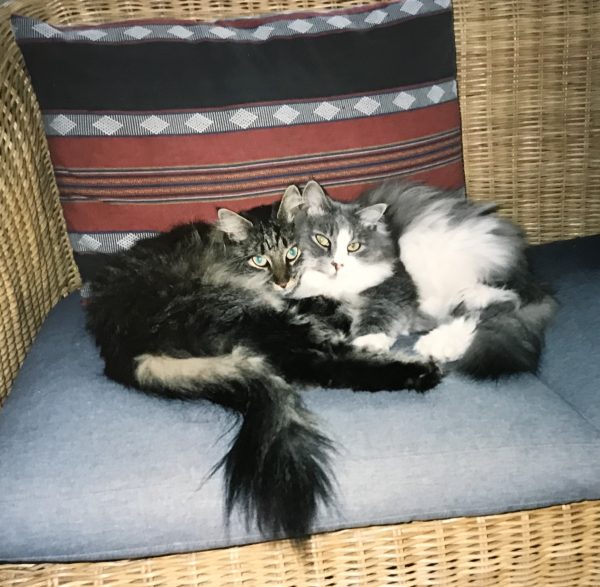 We always knew we were going to do this project, but we put it off because others were more necessary. But this is the renovation which has created the biggest change in our lives. [See Post #45 for the details.]
We always knew we were going to do this project, but we put it off because others were more necessary. But this is the renovation which has created the biggest change in our lives. [See Post #45 for the details.]
Both Zack and the cats have been chasing mice. He gets serious GI tract problems because he eats them. But the cats bring them as offerings to lay at my feet. And very smug they are, afterwards. Either way, it’s a bit daunting, but I’m glad to have those little furry fellows stymied from setting up house indoors.
November
Challenges: mad cow disease is sweeping onto the Continent, and we’ve had major rain storms resulting in scores of deaths all over Europe. So far, no mad cow disease in Italy, but everyone is off beef for the duration.
Russell returned to Italy yesterday. We’ve been having horrendous fog because of all the rain. So I booked a room at a small hotel near the airport for the night before R’s plane arrived from Bangkok at 7:00 a.m. Clear roads home.
December
Russell and Graziano have started to fence a third of our property so Zack can run free during hunting season. He was attacked last August by three hunting dogs who came onto our property, and the vet had to stitch up his face. That was the last straw. R&G are finishing one side of the fence now. The rest will be more complicated, so Graziano and his brother will do that in the new year, when we’ve procured all the materials.
Meanwhile, R&I went by train to Vienna for some pre-Christmas cheer, staying in a 17th century Hungarian nobleman’s palace now converted to a hotel. So much to see and do — Historical Museum of the City of Vienna, Klimt exhibition, Treasury of the Hapsburgs, Lippizzaner Museum, Museum of Fine Arts, Secessionist Museum and Museum of Ethnology, where we went to see their Polynesian collection but walked away stunned by the beauty of the only remaining full Aztec headdress in the world. More — St. Stephan’s cathedral, Church of the Teutonic Order, Church of the Minorites (very beautiful in its simplicity), Spanish Riding School performance.
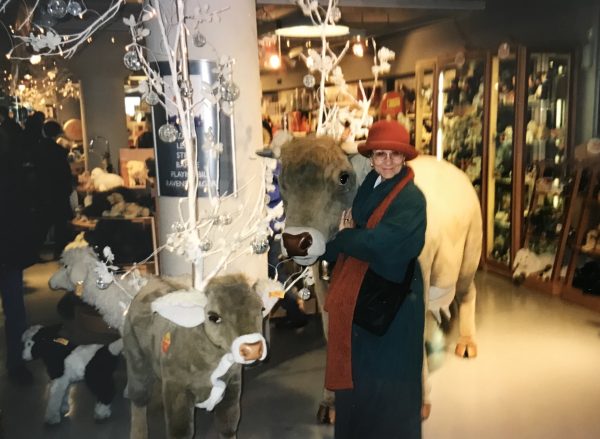 Some of my brightest memories arose from ordinary Vienna life — the elegance of older women in their hats, stylish coats and scarves; coffee houses with plenty of newspapers to read during mid-morning break; good food for every meal, breakfast, lunch and dinner; the not-unpleasant smell of dried horse dung throughout the historic center, thanks to the Lipizzaners and the fiacre-rides; excellent breads crusted with poppy, sesame or sunflower seeds; bookstores seemingly on every block.
Some of my brightest memories arose from ordinary Vienna life — the elegance of older women in their hats, stylish coats and scarves; coffee houses with plenty of newspapers to read during mid-morning break; good food for every meal, breakfast, lunch and dinner; the not-unpleasant smell of dried horse dung throughout the historic center, thanks to the Lipizzaners and the fiacre-rides; excellent breads crusted with poppy, sesame or sunflower seeds; bookstores seemingly on every block.
We returned to Amelia and Christmas visits with local friends at their house or ours. Graziano and wife dropped by unexpectedly to pay their respects on the afternoon we were preparing dinner for Umbro, Elisabetta and family. La Vigilia, traditional dinner before midnight mass, with Giuseppina and family, followed by gift-giving all around. Lunch with Sr. Bruno’s family on the Feast of St. Stephan — lasagna, veal parmesan, roast guinea hens and pigeons, chicory, mixed salad, assorted desserts, wine, champagne and pear grappa. Perhaps most moving was the annual holiday concert at the cathedral, watching friends and acquaintances perform a challenging Bach program. They ended with the yearly tradition of the darkened cathedral’s lights set ablaze as choir and orchestra led us in “Adeste Fideles.” Christmas in Amelia, “home from the sea.”

COMING NEXT MONTH
#47: Italy, January – June 2001
Starting the Millennium
A fence and a pond, mad cow disease, writers writing,
southside garden, Sicily sojourn, the month of mentors

LET ME HEAR FROM YOU.
Please take a moment to share your thoughts.
Your comments help make the blog better, and I always answer.
* * *
If you enjoyed reading this post, I hope you’ll SUBSCRIBE by clicking on the button below. Every month, when I post a new excerpt from my life overseas, you’ll get an email with a link so you can read the next installment. Subscription is free, and I won’t share your contact information with anyone else. Your subscribing lets me know you’re reading what I write, and that means a lot.

